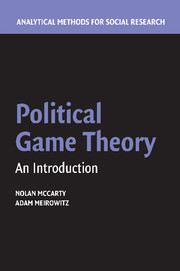Book contents
- Frontmatter
- Contents
- Acknowledgments
- 1 Introduction
- 2 The Theory of Choice
- 3 Choice Under Uncertainty
- 4 Social Choice Theory
- 5 Games in the Normal Form
- 6 Bayesian Games in the Normal Form
- 7 Extensive Form Games
- 8 Dynamic Games of Incomplete Information
- 9 Repeated Games
- 10 Bargaining Theory
- 11 Mechanism Design and Agency Theory
- 12 Mathematical Appendix
- Bibliography
- Index
6 - Bayesian Games in the Normal Form
Published online by Cambridge University Press: 05 June 2012
- Frontmatter
- Contents
- Acknowledgments
- 1 Introduction
- 2 The Theory of Choice
- 3 Choice Under Uncertainty
- 4 Social Choice Theory
- 5 Games in the Normal Form
- 6 Bayesian Games in the Normal Form
- 7 Extensive Form Games
- 8 Dynamic Games of Incomplete Information
- 9 Repeated Games
- 10 Bargaining Theory
- 11 Mechanism Design and Agency Theory
- 12 Mathematical Appendix
- Bibliography
- Index
Summary
The normal form games of the previous chapter assume that agents have complete information or, if there is uncertainty, the same beliefs. But this assumption is often unreasonable. Candidates for office may know more about their policy preferences than voters; interest groups may know more about the relationship between policies and outcomes than legislators; a nation may know more than its rivals about its own military capacity. In many settings ignoring asymmetric information misses many important strategic incentives. Recall the Terrorist Hunt game, which is reproduced in Table 6.1.
The CIA knows that the FBI prefers arresting operatives to making no arrests. The FBI knows that the CIA knows this fact, and so on. The game changes in important ways, however, if the CIA is uncertain whether the FBI prefers arresting operatives to not arresting anyone. Perhaps the FBI feels that the homeland security benefits of capturing the operative do not exceed the costs. If the CIA believed this were the case, it would perceive the game as that in Table 6.2.
The CIA could even believe that the FBI might have yet another preference ordering valuing operatives over kingpins. Perhaps operatives usually fold under pressure, providing lots of information, whereas kingpins remain silent. In this case, the CIA might believe that the game is Table 6.3.
If the CIA is unsure how the FBI evaluates the outcomes, the CIA's calculation of which strategy to play is more complicated.
- Type
- Chapter
- Information
- Political Game TheoryAn Introduction, pp. 150 - 170Publisher: Cambridge University PressPrint publication year: 2007

